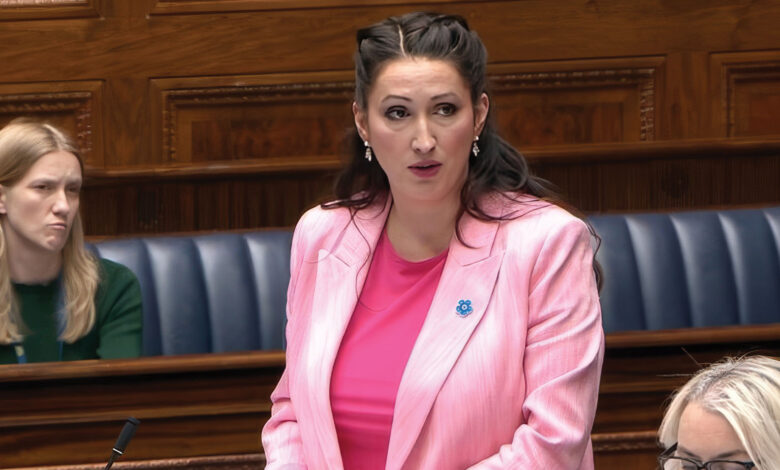Assembly co-option ‘removes democratic choice’

The system of co-option in Northern Ireland risks not following voters’ decisions, the Electoral Commission has said.
In a November 2024 report on elections in 2024 across the United Kingdom, the Electoral Commission says that co-option “removes democratic choice from voters and reduces transparency”. The commission states that this is likely to be exacerbated in 2027, when both the Northern Ireland Assembly and local government elections are scheduled to take place.
The Assembly is the only example of a either a unicameral legislature or lower house in the world where co-option is practised by manner of direct nomination from a political party. While a form of co-option is used in the German Bundestag and for Ireland’s – and formerly Britain’s – seats in the European Parliament, these are on a predetermined list, i.e. a ‘list system’, which is provided to the legislature prior to the holding of an election.
The most common form of filling a vacancy in most parliaments is a by-election, which is used in the event of vacancies in the House of Commons, Dáil Éireann, and the US House of Representatives.
When a vacancy arises in the Northern Ireland Assembly, the nominating officer of a political party fills the vacancy created by the resignation or death of one of its members. This is because these elections use the single transferable vote system, so co-option is in place to ensure that the preference of electors at the previous election continues to be reflected.
“Some parties flagrantly abuse the current system instead of using it as intended, substituting MLAs on and off the pitch like a football manager.”
However, the Republic of Ireland also holds by-elections – even though it also uses the single transferable vote system for general elections.
Following the 2024 UK general election, four sitting MLAs and one councillor were elected as MPs, and resigned from their other elected positions. Through co-option, the vacancies in the Assembly were replaced by a sitting councillor. This created a further four vacancies to be filled in the local councils, also through co-option.
Furthermore, the fact that Alex Easton MP chose to nominate a DUP member upon his election to Westminster, in spite of his Assembly mandate having been as an independent, could be a catalyst for reform.
Forty of the 90 MLAs currently in the Assembly have been co-opted in at some stage during their careers. While the re-election rate of co-optees in the Assembly in 2022 (22 of the 23 MLAs co-opted in the previous term won election in 2022) suggests that this democratic deficit is not an area of concern for voters, the Electoral Commission has said that the use of a ‘substitution list’ akin to those in European elections “may be one possible solution”.
Cahir Hughes, Head of the Electoral Commission in Northern Ireland, says: “It is encouraging following the UK parliamentary general election, voters in Northern Ireland continue to have positive views about how elections are run, with most feeling confident and satisfied with the registration and voting process. Despite this, significant improvements are needed to further support democratic participation and trust in future elections.
“A ‘substitution list’ provided by candidates at the time of nomination may be one possible solution to this issue. Ahead of the 2027 elections, we will engage with the UK Government and political parties to maintain integrity and confidence in the electoral process.”
However, list systems have been utilised for the Assembly in the past. It has been suggested that they were dropped because responsibility for designating a candidate’s substitution list lay with the candidate, with minimal oversight from their political party, meaning that in some instances lists were left blank or were filled with names who were not serious political candidates.
Substituting MLAs ‘like a football manager’
agendaNi contacted all the parties with representation in the Assembly. The SDLP and the Alliance Party have both outlined their support for maintaining co-option in the Assembly, although the SDLP has described the system as “imperfect” and said that “some parties flagrantly abuse the current system instead of using it as intended, substituting MLAs on and off the pitch like a football manager”.
A party spokesperson added: “The SDLP is open to conversations around how we address the current challenges and create a system of replacing elected representatives that is not open to misuse.”
An Alliance Party spokesperson says that “co-options are a necessity, which save the public the cost of by-elections, while preserving the balance of parties which the electorate originally chose, which a by-election may not”.
In a statement to agendaNi, the TUV said that there are “significant issues” with the co-option system both in relation to the Assembly and councils and criticised the Alliance Party for its co-option of Sian Mulholland in North Antrim: “No one in North Antrim has ever voted for Sian Mulholland and the person people did actually vote for decided to leave the Assembly less than a year after being elected and without ever having spoken in the chamber.”
However, the party also said: “While there are occasions when vacancies arising are unavoidable and unpredictable – such as happened following Jim Allister’s election to Westminster – there are occasions when the system is abused.”
People Before Profit MLA Gerry Carroll told agendaNi: “People Before Profit believe that there should be a co-option system in place to allow constituents to have a continuation of the same policies but under a different MLA in the case of a change in circumstances.
“However, it is quite remarkable that the bigger parties have used this mechanism so frequently and seemingly without any embarrassment.
“It’s even more astounding that the joint head of state here was unelected and availed of the co-option mechanism herself.”
Sinn Féin, the DUP, and UUP, did not respond to agendaNi’s request for comment.





